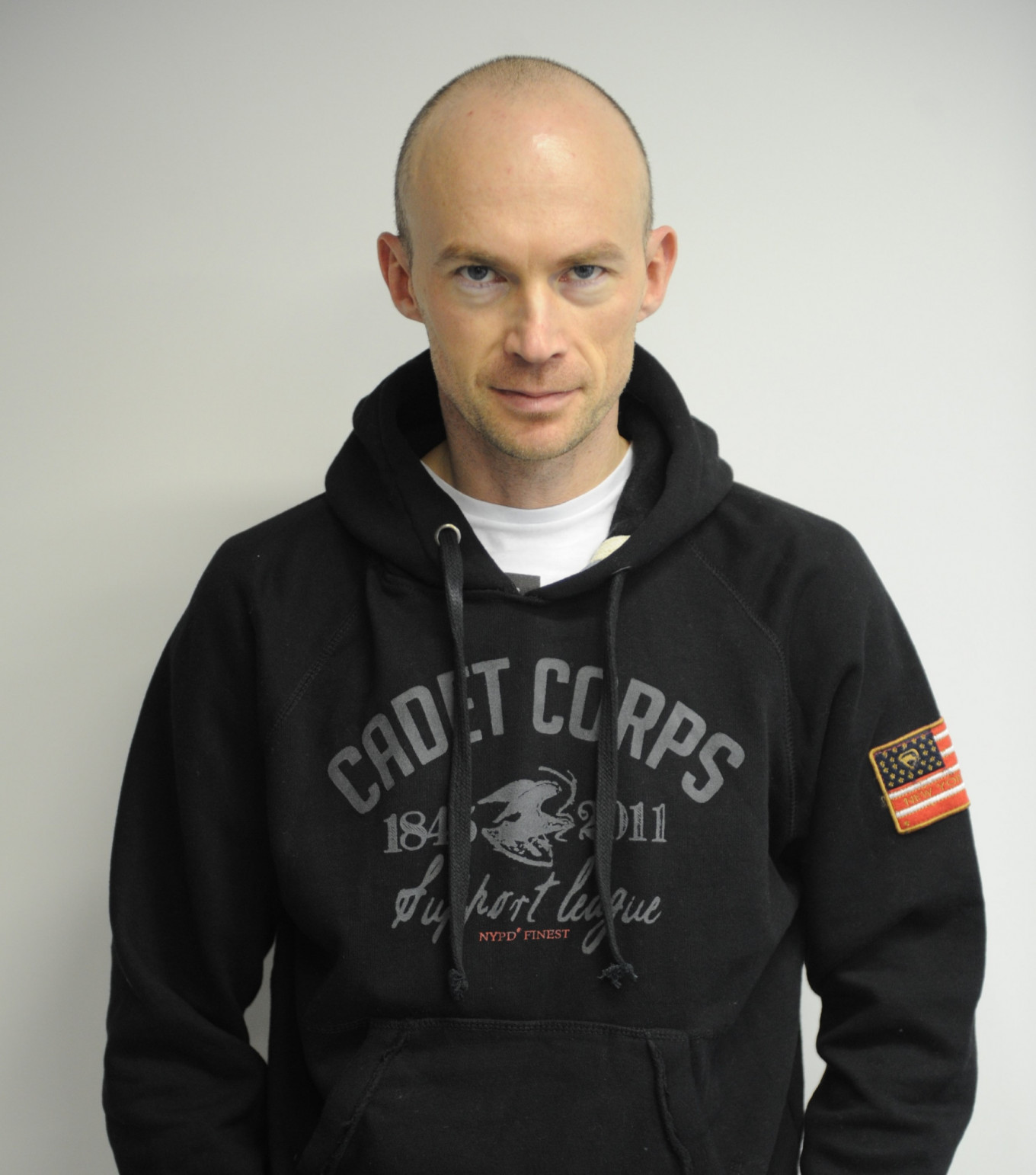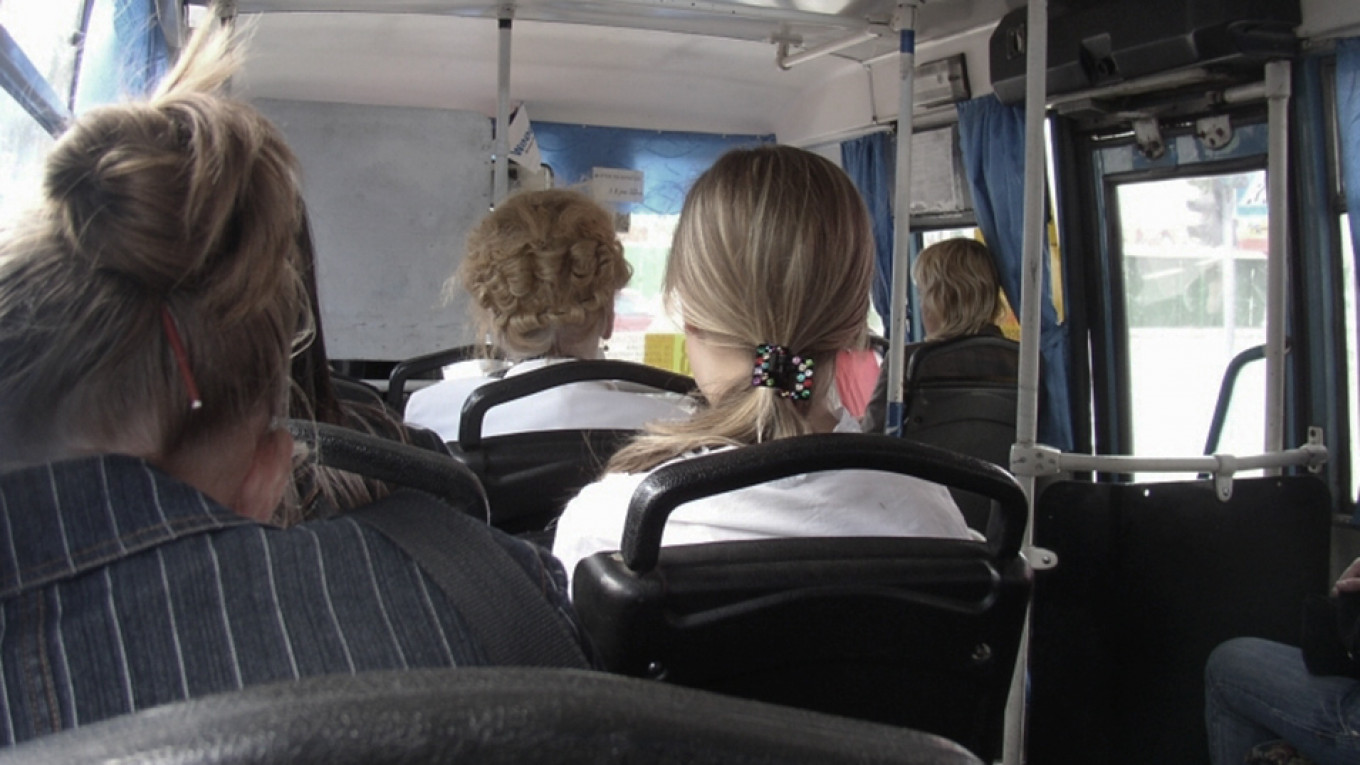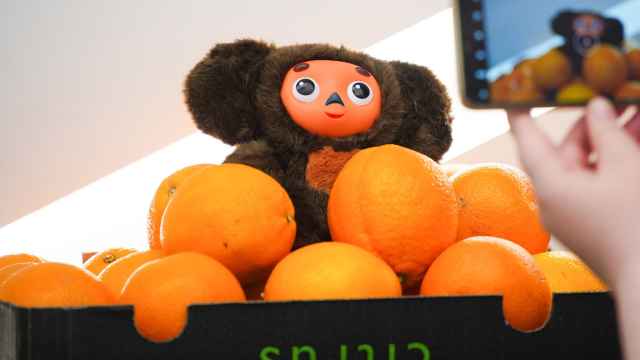Vladimir Kozlov was born in Mogilev, in what was once the Belorussian S.S.R. and is now Belarus. After his childhood and adolescence in industrial Mogilev experiencing all the chaos, upheaval, crime and freedom of the perestroika years, he moved to Minsk and then Moscow.
He has written more than a dozen works of fiction, including “Hoods” (2002); “USSR” (2009); “1986” (2012) and “Lithium” (2018). Many of his works have been translated into other languages, and his novel “Diary of a Perestroika Kid” and “1987 and Other Stories” have been translated into English.
Kozlov’s books have been honored with many nominations and awards, and he was the winner of the Made in Russia award for literature in 2013.
Kozlov also works as a journalist, with work published in Billboard, VICE, and other Western and Russian publications. In recent years he has written and directed films, including “Traces in the Snow,” a documentary about the Siberian punk rock movement of the 1980s.
The Moscow Times asked him to introduce his work in general and the short story “Tangerines” in particular to readers who are not familiar with his writing. The Russian text follows the translation.
Although this story takes place in Russia, it’s about universal themes. Perhaps a reader won’t understand all the details, but the emotions and sensibilities should be understandable: at a certain age a person feels caged in and tries to escape however he can.
It’s a crisis in part connected with age and in part connected with aspects of capitalist reality, and although the details are different Moscow or London or New York, but the essence is the same. I identify with and understand my characters absolutely. They are people I could have become and could be in these circumstances. Maybe their actions are not the most moral, but I understand why they are doing what they are doing.
There is also a generational aspect. For people my age — about 40-50 years old — our youth took place during perestroika and reforms when there was a lot of hope for the future: the USSR would collapse, the system would change radically and life would become entirely different. Of course, we were disappointed that life didn’t change as much as we wanted, and that’s reflected in how my heroes act.
When you read one of my stories, try not to have any expectations. There are a lot of stereotypes and expectations about Russian literature and writers. But I think that the line of Russian literature that appeared in the late 19th and early 20th centuries — and then continued later with writers like Platonov — that line has exhausted itself. That manner of writing is very anachronistic. There are people who like to chew over the same ideas and styles, but not me.

"Tangerines"
By Vladimir Kozlov
Translated from the Russian by Andrea Gregovich
I ducked my head and made my way to the empty seats in the rear of the taxibus, then sat in the corner. The layout was idiotic—three seats on each side in the back were facing each other.
It seemed like things used to be different. It had been a long time since I'd taken a taxibus.
Maybe three or four years.
A few people were still getting on, filling up all the seats. The taxibus started up and rolled along through the dismal bedroom suburb. A girl about eighteen years old was sitting right across from me. I looked at her knees in their flesh-colored nylons. She took a tangerine out of a plastic bag, poked it with a fingernail, and peeled off the skin, throwing the pieces in the bag.
I had, of course done something stupid, and it was fair for Olya to get all bent out of shape about it. Still, she didn't have to make a face like that. Like I got in an accident and it was my own fault or something. But even so, I guess didn't have to leave the car in a spot where it could get towed. As a result Olya and Natasha had to take the metro home, and I had to make my way out to goddamn Pechatniki to pay the fine and reclaim the car.
"Stop at the end of the fence,” said the girl with the tangerines. The driver, who didn't look Russian, nodded. The girl stood up and picked up her purse and the bag with the tangerines and peels. The taxibus stopped. She got off. I got off behind her, pushing the door closed. The taxibus drove off. The girl walked past a temporary garage to a typical old nine-story. I caught up with her. She noticed me, then turned and looked at me.
“Do you have any money?” she asked. “There's nothing to drink at my place.”
I nodded. She turned in to the store on the side of the building. A black sheepdog was tied to the railing on the stairs. Three teenagers were leaning against the wall drinking beer. She nodded to them. One guy said hi.
We went down into the semi-basement store.
“What do you drink?” she asked.
I shrugged. “I drink everything.”
“Then let's get two bottles of wine. Any kind, but semi-sweet. I've got some munchies at home.”
*
We got out of the elevator. She took out a key and unlocked the iron door, which was upholstered in brown leatherette—the cheap kind, like a lot of people had. I took a hesitant step behind her through the doorway. She turned on the light. A standard small two-bedroom, all the room doors open. I set the bag with the bottles of wine on the floor and shut the apartment door. She took off her jacket and hung it on a hook, which left her in a brown skirt a little higher than her knees and a blue blouse with a low-cut neckline. Her white bra was visible in the depth of the cut. She took a half step backward, leaned against the wall and looked at me. I realized who her face reminded me of—an actress, popular in the nineties. She acted in a few films then disappeared. Juliette Lewis.
“You just gonna stand there?” she asked. “Let's drink the wine.”
*
She was smoking, standing by the kitchen window. There was another nine-story out the window. Its windows were lit up. Figures were passing in and out of view in some of them. I pulled the sim-card out of my cell phone, broke it in half, drank the wine in my glass, and went over to her. She put out her cigarette in a glass ashtray on the window sill. We started kissing. It had been many years since I'd tasted cigarette in a girl's mouth. Olya never smoked—she pretty much never did anything “unhealthy.” I unbuttoned this girl’s blouse and squeezed her breasts over her bra with both my hands. She leaned back on the window sill, grabbing it with both her hands. I shoved my hand under her skirt and pulled down her panties and her nylons in the process.
*
I was lying on the double bed, covering myself with blanket. I didn't give a damn who else had slept on the sheets, which weren't very fresh. She sat beside me, leaning against the rug on the wall and smoking. The light was off in her room, which was instead lit up by the streetlight outside. She threw her cigarette in a glass and got up from the bed.
“Bring me what's left in the bottle,” I said.
She nodded and left the room. The latch clicked. The door to the toilet opened and shut. I thought about the fact that Olya was prettier—more slender, and she had a better figure, even though she was thirty-two and had given birth. Water murmured in the toilet as it flowed from the tank. She came back with the bottle—it was still half full. I picked it up and took a long swig.
She crawled under the blanket beside me. I said:
“It's all just so strange. You go through life like there's a template, a formula. School, then the institute, then work ... So you can have some kind of career, for the money. Then marriage, a family ... Friction's inevitable, what with a father-in-law and mother-in-law. You don't love them, they don't love you ... But somehow you get used to it, or you do at least if you have a baby. Then there's the apartment and a mortgage, a new car, going somewhere on holiday. And you don't even fucking notice how much time has flown by ... Two years, maybe even three ...”
“Why are you telling me all this?”
“I don't know ... I guess, well, I mean ...”
“It's better if you don't say anything, alright? You didn't say anything when you got off the taxibus. I don't like it when there's all this silly claptrap—‘Hey baby, what's your name?’ You know what I mean.”
“Isn’t there anything you want to tell me about yourself?”
“There's isn’t really anything to tell. I finished school last year. I didn't want to enroll anywhere. I got a job as a store clerk, didn't like it.”
“You only do things you like doing?”
“I try to. Of course, it doesn't always work out that way. Even so, it's possible not to do things you don't like.”
“You live with your parents?”
“Yeah, but they're staying at the dacha right now until winter. It's easier for them to go to work from there. But I stay here because I feel like it.”
“Do they leave you money?”
“They do, but not much. Just for the basics, groceries ...” She smiled. I picked up the half bottle, took a swig, and passed it to her. She took a drink, then set the bottle on the floor. I moved closer. We started kissing.
*
I opened my eyes. It was light out. The clock on the wall said twenty past ten. I couldn't remember the last time I got up so late on a weekday—not counting holidays, of course. She was still asleep. I got up from the bed, went over to the window, looked down on the courtyard covered with darkening leaves, then at the neighboring nine-story, at the yard maintenance crew in their orange vests. The bed creaked. I turned. She looked at me and smiled.
“If there's any money left, maybe we could go to the store and get some beer and shrimp,” she said.
“You mean, like for breakfast?”
“I don't keep them separate like that—this is breakfast, this is lunch. If you feel like eating, then eat. Aren't you like that?”
I shrugged and grinned.
*
It was dark out the window in the kitchen. I looked at the clock—half past one. In the nine-story opposite only two or three windows were lit. There were about a dozen empty beer bottles on the floor—we’d been drinking them all day. I picked up a bottle from the floor, took a swig, stood back and looked at her.
She said, “I usually don't like to drink a whole lot. I like to take it to the point where I'm having a good time and then level off there.”
“Does that work?”
“Not always,” she smiled, letting out smoke. “Sometimes I drink, like, more than I should.” I took another swig of beer. She threw her butt in the empty bottle. I went over to her and shoved my hands under her robe. We kissed. A car drove past below, and somebody’s car alarm went off.
*
She was standing by the window in her robe, smoking. I straightened the pillow and pulled the blanket over my legs, which were sticking out.
“You have to go,” she said, looking out the window.
“Are your parents coming home or something?”
“What's the difference?”
I got up from the bed, wrapped myself in the blanket, and plodded to the bathroom in my bare feet. I picked my underwear and socks up off the radiator.
*
The building's front door shut behind me. I turned back toward the bus stop, took out my wallet on the way, and counted the money I had left. Probably not enough to pick up the car. I did have my bank card, but what if there wasn't an ATM nearby?
A dirty van was parked by the store along the side of the building. A man was delivering boxes of beer out of it.
A taxibus rolled up. I opened the door and climbed on. The driver was again not Russian. It may have even been the same one. The taxibus started up again.
From "1987 and Other Stories," published by the Fiction Advocate
***
Мандарины
Пригнувшись, я прошел к свободным задним сиденьям маршрутки, сел в углу. Идиотская планировка – сзади по три сиденья друг напротив друга. Раньше вроде было по-другому. Я давно уже не ездил на маршрутках. Года три или четыре.
Зашли еще несколько человек, заняли все места. «Газель» тронулась, покатилась по унылому спальному микрорайону. Напротив меня сидела девушка лет восемнадцати. Я посмотрел на ее колени в колготках телесного цвета. Она взяла из пакета мандарин, подковырнула ногтем и сняла кожуру, бросив ее куски в пакет.
Я, конечно, сам сделал глупость, и Оля на меня разозлилась по делу. Хотя, наверное, могла бы и не делать такое лицо. Как будто я в аварию попал по собственной вине или что-нибудь в этом роде. Но, все равно, не надо было оставлять машину там, где ее могут эвакуировать. В результате Оле с Наташкой пришлось на метро ехать домой, а я поперся в Печатники, для оформления документов на «забрать машину».
– У конца забора остановите, – сказала девушка с мандаринами. Водитель нерусского вида кивнул. Девушка встала, взяла свою сумочку и пакет с мандаринами и кожурой. Машина остановилась. Она вышла. Я вышел за ней, задвинул дверь маршрутки. «Газель» отъехала.
Девушка шла мимо «ракушек» к старой типовой девятиэтажке.
Я догнал ее. Она заметила меня, повернулась, посмотрела.
– У тебя есть деньги? – спросила она. – Дома ничего нет выпить…
Я кивнул. Она свернула к магазину в торце дома. К перилам лестницы была привязана черная овчарка. Прислонившись к стене, пили пиво два тинэйджера. Она кивнула им, парни сказали:
– Привет.
Мы спустились в полуподвал магазина.
– Ты что пьешь? – спросила она.
Я пожал плечами.
– Все пью.
– Тогда купи две бутылки вина. Любого, но полусладкого. Хавка у меня дома есть.
* * *
Мы вышли из лифта. Она вынула ключ, отомкнула железную дверь, обитую коричневым дерматином – дешевую, такие стоят у многих. Я неуверенно сделал шаг за ней через порог. Она включила свет. Обычная маленькая «двушка», двери во все комнаты открыты. Я поставил на пол пакет с бутылками вина, захлопнул входную дверь. Она сняла куртку, повесила на крючок, осталась в коричневой юбке чуть ниже колена и синей кофточке с глубоким вырезом. В глубине выреза был виден белый лифчик. Она сделала полшага назад, прислонилась к стене, глянула на меня. Я вспомнил, на кого она похожа лицом – на актрису, популярную в девяностые годы. Она снялась в нескольких фильмах, потом куда-то пропала. Джульетт Льюис.
– Так и будем стоять? – спросила она. – Пойдем пить вино.
* * *
Она курила, стоя у окна кухни. За окном была такая же девятиэтажка. Светились окна. В некоторых из них мелькали фигуры людей. Я вынул из мобильника сим-карту, разломал ее пополам, допил вино в стакане, встал, подошел к ней. Она потушила сигарету в стеклянной пепельнице на подоконнике. Мы поцеловались. Я много лет не чувствовал сигаретного вкуса во рту у девушки. Оля никогда не курила, вообще не делала ничего «нездорового».
Я расстегнул ее кофточку, двумя руками сжал грудь под лифчиком. Она прислонилась задом к подоконнику, взялась за него двумя руками. Я просунул руки ей под юбку, потащил вниз трусы с колготками.
* * *
Я лежал на двуспальной кровати, укрывшись одеялом. Мне было наплевать, кто раньше спал на этой не очень свежей постели. Она сидела рядом, прислонившись к ковру на стене, курила. Свет в комнате не горел, ее освещал фонарь с улицы. Она бросила сигарету в стакан, встала с кровати. Я сказал:
– Принеси, что осталось в бутылке.
Она кивнула, вышла из комнаты. Щелкнул выключатель. Открылась и захлопнулась дверь в туалет. Я подумал, что Оля красивее – стройнее, с лучшей фигурой, хоть ей уже тридцать два и она рожала. В туалете зажурчала вода, выливаясь из бачка. Она вернулась с бутылкой – там была еще половина. Я взял бутылку, сделал долгий глоток. Она залезла под одеяло рядом со мной. Я сказал:
– Странно все как-то… Живешь, как будто по шаблону, по формату. Школа, потом институт, потом – работа… Чтобы какая-то карьера, деньги там… Потом – женился, семья… Трения неизбежные – тесть, теща. Ты не любишь их, они не любят тебя… Потом как-то привыкнешь, или не до этого – если ребенок… Квартира – ипотека, машина новая, съездить куда-то там в отпуск… И ни хера не замечаешь, как время летит… Год, два, три…
– Зачем ты мне все это говоришь?
– Так, не знаю… Ну, как бы…
– Лучше ничего не говори, ладно? Ты же ничего не говорил, когда вышел из маршрутки… Я не люблю, когда вся эта хренотень: «Девушка, а как вас зовут?» Ну, ты понял…
– И про себя ничего не расскажешь?
– А мне нечего особо рассказать… Школу закончила в том году. Поступать никуда не хотела. Пошла поработала продавцом – не понравилось…
– Ты делаешь только то, что нравится?
– Стараюсь… Нет, так не бывает, конечно. Но можно хотя бы не делать то, что не нравится…
– Ты живешь с родителями?
– Да, но они сейчас на даче – до зимы. Им оттуда лучше ездить на работу… А я здесь – как хочу…
– Деньги оставляют?
– Оставляют, но немного. В основном, продуктами…
Она заулыбалась. Я взял с пола бутылку, сделал глоток, передал ей. Она тоже отпила, поставила бутылку на пол. Я придвинулся поближе, мы стали целоваться.
* * *
Я открыл глаза. Было светло. На часах на стене – двадцать минут одиннадцатого. Я не помнил, когда последний раз так поздно просыпался в будний день – не считая, конечно, отпусков. Она еще спала. Я встал с кровати, подошел к окну, посмотрел на двор, засыпанный почерневшими листьями, на соседнюю девятиэтажку, на дворников в оранжевых жилетах. Заскрипела кровать. Я обернулся. Она смотрела на меня, улыбалась.
– Если деньги еще остались, можно сходить в магазин – купить пива, креветок, – сказала она.
– Это будет наш завтрак?
– А я не думаю особо – завтрак там, обед. Если хочется есть, то ем… У тебя что, не так?
Я пожал плечами, усмехнулся.
* * *
За окном кухни было темно. Я глянул на часы – полвторого ночи. В девятиэтажке напротив светились два или три окна. На полу стояли полтора десятка бутылок пива – мы его выпили за сегодняшний день. Я взял бутылку со стола, сделал глоток, поставил обратно, посмотрел на нее. Она сказала:
– Вообще, я не люблю пить много… Я люблю, чтоб наступил, как бы, кайф, – и потом его поддерживать…
– И удается?
– Не всегда… – она улыбнулась, выпустила дым. – Иногда, это самое, перебираю…
Я сделал еще глоток пива. Она бросила бычок в пустую бутылку. Я подошел к ней, просунул руки под халат. Мы поцеловались. Внизу проехала машина, «завелась» сигнализация.
* * *
Она стояла у окна в халате, курила. Я поправил подушку, натянул одеяло на торчащие ноги.
– Тебе надо уходить, – сказала она, глядя в окно.
– Что, родители приезжают?
– Какая разница?
Я встал с кровати, завернулся в одеяло, прошлепал босыми ногами в ванную. Снял с батареи свои трусы и носки.
* * *
За спиной хлопнула дверь подъезда. Я свернул к остановке, на ходу вынул кошелек, пересчитал оставшиеся деньги. Наверное, не хватит, чтобы забрать машину. Есть еще кредитка, но вдруг поблизости нет банкомата?
У магазина в торце дома стоял фургон с грязными боками. Мужик доставал из него ящик пива.
Подъехала маршрутка. Я открыл переднюю дверь, залез. Водитель опять был нерусский. Может быть, даже тот самый. Машина тронулась.
A Message from The Moscow Times:
Dear readers,
We are facing unprecedented challenges. Russia's Prosecutor General's Office has designated The Moscow Times as an "undesirable" organization, criminalizing our work and putting our staff at risk of prosecution. This follows our earlier unjust labeling as a "foreign agent."
These actions are direct attempts to silence independent journalism in Russia. The authorities claim our work "discredits the decisions of the Russian leadership." We see things differently: we strive to provide accurate, unbiased reporting on Russia.
We, the journalists of The Moscow Times, refuse to be silenced. But to continue our work, we need your help.
Your support, no matter how small, makes a world of difference. If you can, please support us monthly starting from just $2. It's quick to set up, and every contribution makes a significant impact.
By supporting The Moscow Times, you're defending open, independent journalism in the face of repression. Thank you for standing with us.
Remind me later.






